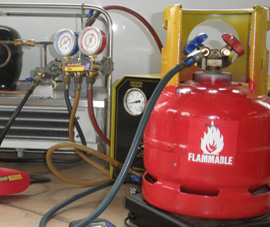Practical Refrigeration Training Centre
+44 (0) 1282 452152
Refrigeration, Air Conditioning and Electrical Training

Introduction
With the increasing emphasis on the use of 'natural' refrigerants, City and Guilds have developed this stand alone module to provide operatives with a recognised qualification in the safe handling of hydrocarbons and their safe use in hydrocarbon RAC systems.
Our course has recently been updated to include A2L sand A3 flammable gases.
The one day course is only suitable for extremely experienced engineers and although not mandatory we strongly recommend that anyone attending this course should already hold a category 1 or category 2 'F Gas' qualification (either City and Guilds 2079 or Construction Skills J11 or J12).
Objective
To obtain the City and Guilds 6187-21 Hydrocarbon qualification.
Methodology
A presentation/discussion session will reinforce the theory. The assessment will be a mixture of a practical test and a multiple choice, written question paper. Full course notes will be provided in advance.
Synopsis
The course will include the following topics:
• The dangers of working with hydrocarbons including health and safety requirements and identification of hazards.
• Regulations, codes of practice and industry recommendations for installation, servicing and maintaining and de-commissioning hydrocarbon RAC systems.
• Properties of hydrocarbon refrigerants, their advantages and disadvantages and typical applications.
• Understanding the differences between halocarbon and hydrocarbon RAC systems including identification of components and system features unique to hydrocarbon systems.
• Plan and prepare for work on hydrocarbon RAC systems - risk assessments, appropriate tools and PPE, and establishment and maintenance of a safe area.
• Servicing and maintaining hydrocarbon RAC systems.
• Installing and testing hydrocarbon RAC systems including leak and strength testing, evacuation and dehydration.
• Re-commissioning procedures for hydrocarbon RAC systems.
• Safe handling of hydrocarbon refrigerants including charging and recovery.
• Safe storage and transportation of hydrocarbon refrigerants.

 Practical Refrigeration Training Centre Limited
Practical Refrigeration Training Centre Limited